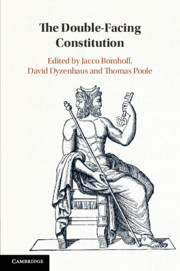Book contents
- The Double-Facing Constitution
- The Double-Facing Constitution
- Copyright page
- Contents
- Contributors
- 1 Introduction
- Part I Theoretical Foundations
- 2 The Janus-Faced Constitution
- 3 The Idea of the Federative
- 4 Hobbes’s Janus-Faced Sovereign
- 5 Jurisprudential Reflections on Cosmopolitan Law
- 6 From Republican Self-Love to Cosmopolitan Amour-Propre: Europe’s New Constitutional Experience
- Part II Border Crossings: Comity and Mobility
- Part III The Foreign in Foreign Relations Law
- Index
5 - Jurisprudential Reflections on Cosmopolitan Law
from Part I - Theoretical Foundations
Published online by Cambridge University Press: 17 January 2020
- The Double-Facing Constitution
- The Double-Facing Constitution
- Copyright page
- Contents
- Contributors
- 1 Introduction
- Part I Theoretical Foundations
- 2 The Janus-Faced Constitution
- 3 The Idea of the Federative
- 4 Hobbes’s Janus-Faced Sovereign
- 5 Jurisprudential Reflections on Cosmopolitan Law
- 6 From Republican Self-Love to Cosmopolitan Amour-Propre: Europe’s New Constitutional Experience
- Part II Border Crossings: Comity and Mobility
- Part III The Foreign in Foreign Relations Law
- Index
Summary
Evan Fox-Decent defends the basic claim that ‘the state’s public law governing its interactions with non-citizens – the state’s cosmopolitan law – must have a certain outward orientation and representative character if it is to be law, properly so-called’. Drawing on earlier work with his frequent co-author Evan Criddle, Fox-Decent invokes the conceptual vocabulary of the ‘fiduciary criterion of legitimacy’ to denote the stipulation that state action ought always to be intelligible as ‘action made on behalf of or in the name of the individual subject to it’, if it is to be legitimate, regardless of whether this individual is a citizen or an outsider in some sense. He uses a discussion of Joseph Raz’s notion of authority, and of the ‘riveting and intractable’ problem of ‘the non-jurisdictional/jurisdictional distinction to distinguish de facto from legitimate authority’ and on this basis constructs his case for the ‘fiduciary criterion’. When it comes to the outer boundaries of the constitutional order, this criterion functions as a ‘cosmopolitan threshold – not a barrier – that welcomes the entry of peaceful outsiders into sovereign states while empowering states to limit migration when conditions warrant’.
Keywords
- Type
- Chapter
- Information
- The Double-Facing Constitution , pp. 121 - 152Publisher: Cambridge University PressPrint publication year: 2020

